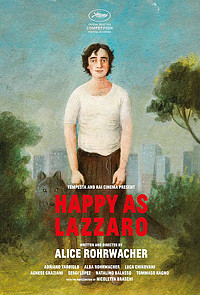| SHADOWS ON THE WALL | REVIEWS | NEWS | FESTIVAL | AWARDS | Q&A | ABOUT | TALKBACK | |||||||||||||||||||||
 Shadows off the beaten path Shadows off the beaten pathIndies, foreigns, docs, revivals and shorts...
On this page:
HAGAZUSSA |
HAPPY AS LAZZARO |
LORO
| |||||||||||||||||||||
| See also: SHADOWS FILM FESTIVAL | Last update 15.Apr.19 | |||||||||||||||||||||
|
Hagazussa Review by Rich Cline | 
| |||||||||||||||||||||
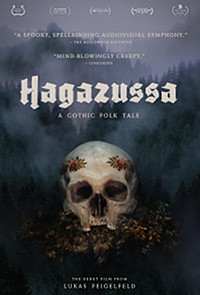 dir-scr Lukas Feigelfeld prd Lukas Feigelfeld, Simon Lubinski with Aleksandra Cwen, Celina Peter, Claudia Martini, Tanja Petrovsky, Gerdi Marlen Simon, Haymon Maria Buttinger, Franz Stadler, Thomas Petruo, Judith Geerts, Kilian Abeltshauser, Maximilian Hinterberger, Richard Gerum release UK Oct.17 lff, Ger 17.May.18, US 19.Apr.19 17/Germany 1h42  |
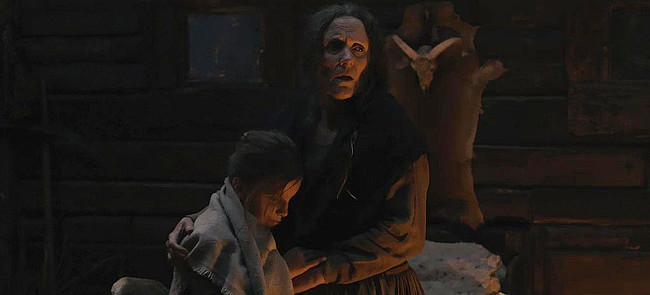 Moody and atmospheric, this German horror film plays on ancient legends as it recounts an old-world tale about a dark curse. With an approach reminiscent of Robert Eggers' The Witch, filmmaker Lukas Feigelfeld takes his time to create a terrifyingly spooky vibe, mixing ancient superstition with present-day paranoia. The imagery is astonishing, shot with artistry and skill to pull patient viewers right into a gruesome nightmare. In 15th century Europe, Martha (Martini) and her young daughter Albrun (Peter) trek through a snowy forest to get home before dark. Outcasts, they are taunted by villagers for being witches. So when Martha is taken ill, Albrun has to care for her. Years later, Albrun (now Cwen) enjoys a spring outing in the mountains with her goats and her infant daughter. Neighbour Swinda (Petrovsky) helps defend her from the cruel village boys, although she may have her own intentions. But Albrun is worried about her baby, which pushes her to do some extreme things. The film's pace is deliberately slow, unfurling the narrative in four chapters over four seasons: Shadow, Horn, Blood, Fire. The story's animalistic moments are deeply unnerving; even if the grisliest stuff remains off-screen, the sounds are more than nasty enough. Meanwhile, the setting is is a terrific mix of expansive natural beauty and underlying creepiness. The local church is its own visually stunning freak-out, wedged into a hill with walls made of skulls and a priest (Buttinger) who quietly wants to cleanse the village of sacrilege. Performances are relentlessly understated, but Cwen has a superbly expressive face, and her little glances add powerful echoes of yearning, fear and hope. Although the slim storytelling leaves many of her actions eerily opaque. Petrovsky is also excellent, quietly expressing Swinda's underlying interest in Albrun before taking her in an unexpected direction. Many scenes are a frightening mixture of ritual and performance art, unclear how they connect to the story but adding viscerally paganistic touches. With its sparse dialog and long, slowly played scenes, this is perhaps a film for arthouse horror fans only. Feigelfeld keeps the story's movement steady and sometimes inert, adding chills through casually grim moments and a fantastic harmonic score by someone called Mmmd. The film also finds odd moments of sensuality in surprising places (like a goat's milk or repeated images of perfect apples). Yes, the most clever touches are those that mix beauty and horror, adding a dreamlike kick to the whole film.
| ||||||||||||||||||||
|
Happy as Lazzaro Lazzaro Felice Review by Rich Cline |  MUST
MUST  SEE SEE

| 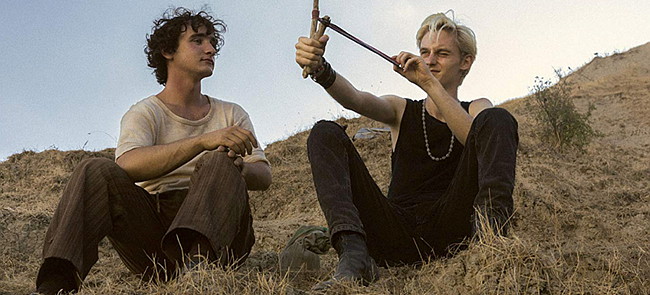 So beautifully made that it looks and feels like a timeless classic, complete with grainy 16mm imagery and rounded-off corners, this slice of magical realism from Italy carries provocative insight into the state of the world. It's a remarkable achievement, packed with intriguing ideas and a central story that's gripping and often darkly wrenching. And it's also a yearning cry for kindness and honesty in a corrupt world. In a cut-off corner of Italy at the end of the 20th century, an extended family is still living a feudal existence, exploited by the Marchesa (Braschi) and her husband (Balasso) as they try to keep their tobacco plantation running. Among the workers is Lazzaro (Tardiolo), a guileless young man who helps everyone, often missing the cruel pranks that are played on him. He and the Marchesa's lonely, spoiled son Tancredi (Chikovani) become unlikely friends, and Lazzaro haplessly goes along with Tancredi's silly plot to kidnap himself. But this ultimately changes everything about their lives. After a series of heart-stopping events, the story leaps forward some 20 years to a big city, where these characters reconnect with each other and the world around them. The one consistent through both halves of the film is how Lazzaro's goodness is encircled by the petty criminality of the desperate poor and the callous cruelty of the church and state. Yes, these are potent themes, but writer-director Rohrwacher centres the story in engaging characters, which makes the film funny, scary, thrilling and darkly moving. Tardiolo delivers an unearthly performance as Lazzaro, never overplaying his alien-like movement or wide-eyed emotions. His presence in each scene is almost unnervingly involving, as people continually ask him to do things for them, because they know he will. His generosity knows no bounds, and yet his motives are still suspect. The characters surrounding him are lively and memorable, including his "sister" Antonia (Graziani, then Rohrwacher) and Chikovani's fantasist Tancredi (later Ragno). Rohrwacher has created a vivid fable that merges a variety of storytelling styles, including a mash-up of Italian filmmaking from neorealism to Felliniesque flights of fancy. The plot cleverly blends historical events with issues that feel powerfully resonant today, using a variation on time-travel to explore how humanity simply swaps one kind of oppression for another. And yet the pure core of humanity is still there, reminding us that there is a better way to treat each other.
|
| Loro Review by Rich Cline | 
|  dir Paolo Sorrentino scr Paolo Sorrentino, Umberto Contarello prd Carlotta Calori, Francesca Cima, Nicola Giuliano, Viola Prestieri with Toni Servillo, Elena Sofia Ricci, Riccardo Scamarcio, Kasia Smutniak, Euridice Axen, Fabrizio Bentivoglio, Roberto De Francesco, Dario Cantarelli, Anna Bonaiuto, Giovanni Esposito, Ugo Pagliai, Alice Pagani release It 24.Apr.18, UK 12.Apr.19 18/Italy 2h31
| 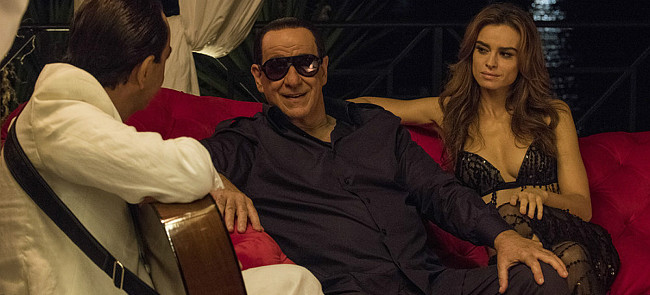 Italian maestro Paolo Sorrentino's ambitious exploration of the notorious Silvio Berlusconi declares its intentions at the start: mixing fictional storytelling with real-world people and events. This cut of the film is edited down from a longer two-part version, and it still feels rather extended and overwhelming for non-Italians. But it's packed with brilliant filmmaking touches and carries a strong kick. In Puglia, Sergio (Scamarcio) supplies high-class prostitutes to local politicians, but he and his wife Tamara (Axen) have their eyes on Rome and getting closer to "Him". That's how they refer to disgraced ex-president Silvio Berlusconi (Servillo), whose marriage to Veronica (Ricci) is finally falling apart amid his rampant womanising. When Sergio meets top hooker Kira (Smutniak), she offers a route to Him, so Sergio sets out to build a stable of irresistible women as temptation. Meanwhile, Silvio is living his free-spirited life while manipulating the system so he can return to power. Sorrentino unfurls this story with Luca Bigazzi's glorious cinematography and a lavish design and editing style (see also his Oscar-winning The Great Beauty). The tone is comical even when scenes turn suddenly dark. But then Silvio always has a broad grin pasted across his face. And the film vividly captures each man's lascivious macho gaze, relishing barely clad women as they lounge around various swimming pools. Servillo is magnetic, turning Silvio into the life of the party. Aside from some verbal manipulation, there's virtually no depiction of his villainy, and his sexuality is entirely off-screen. It's a big, broad performance that's eerily charming, as it should be. By contrast, Scamarcio adds some earthy grit as a guy trying desperately to be like his idol, but often missing the point. And Ricci, Smutniak and Axen have strong scenes as the women in the centre of the storm. The bold filmmaking is laced with surreal touches that are eye-catching and often darkly meaningful. But it isn't easy keeping up with the film's constantly shifting mood and unevenly paced narrative. And several thematic touches (a rat, rubbish truck, devastating earthquake) are simply far too obvious. Still, Sorrentino is an expert at keeping the audience on its toes, never quite sure where things might go next. He also knows how to take a very specific story and mine the more universal elements from it, because there are rather terrifyingly close parallels to Berlusconi's story taking place in another part of the world right now.
| 
See also: SHADOWS FILM FESTIVAL © 2019 by Rich Cline, Shadows
on the Wall
HOME | REVIEWS | NEWS | FESTIVAL | AWARDS
| Q&A | ABOUT | TALKBACK | | ||||||||||||||

